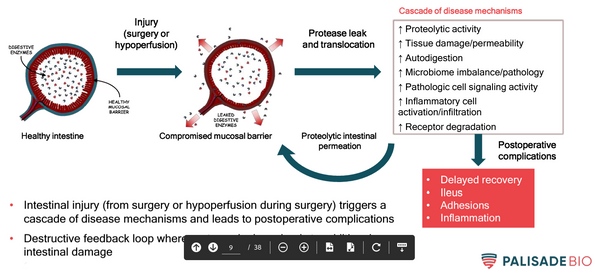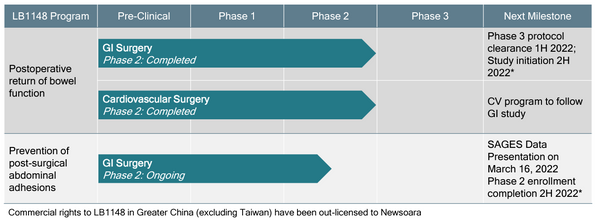Dallas, Texas -- March 14, 2022 -- Stonegate Capital Partners is hosting a webcast for Palisade Bio (NASDAQ: PALI) to discuss clinical data on LB1148, an investigational treatment of post-surgical abdominal adhesions. The virtual presentation will review the Company's data being presented at the SAGES 2022 Annual Meeting and the need for new pharmaceutical options to prevent post-surgical abdominal adhesions. The live virtual event will begin Wednesday March 16th 2022 at 8:30 am ET and be available by replay. >> Click here to register or attend.
The data being discussed is also being presented at the American Gastrointestinal and Endoscopic Surgeons (SAGES) 2022 Annual Meeting as an ePoster titled:
“Pooled-Analysis of Incidence and Severity of Post-Surgical Intraabdominal Adhesions following Bowel Resection Surgery and Treatment with Enteral Protease Inhibitor LB1148”
Palisade Bio’s Chief Medical Officer, Michael Dawson, M.D., will present the data and be joined by one of the investigators of the study, Ronald Hurst, M.D. The Angeles Clinic and Research Institute a Cedars-Sinai Affiliate, during a public webcast hosted by Stonegate Capital Partners the morning of March 16. Stonegate Managing Partner Shiv Kapoor will host the event.
Why Join
“There is a significant unmet need to prevent adhesions with almost seven million surgeries each year in the U.S. where patients are at risk for postoperative adhesions. Adhesions can be found in up to 90% of cases after intra-abdominal surgery. Some patients will suffer life-long complications, and it’s also estimated that the US medical system spends more than $2 billion dollars a year on treating patients with postoperative adhesions,” said Michael Dawson, M.D., Chief Medical Officer, Palisade Bio.
"With the medical system still looking for safe therapeutics to reduce abdominal adhesions, we are excited about the potential of LB1148 to prevent and mitigate costly and dangerous side effects of surgery. We look forward to sharing additional data on the incidence and severity of adhesions from the pooled analysis of patients treated with LB1148.”






